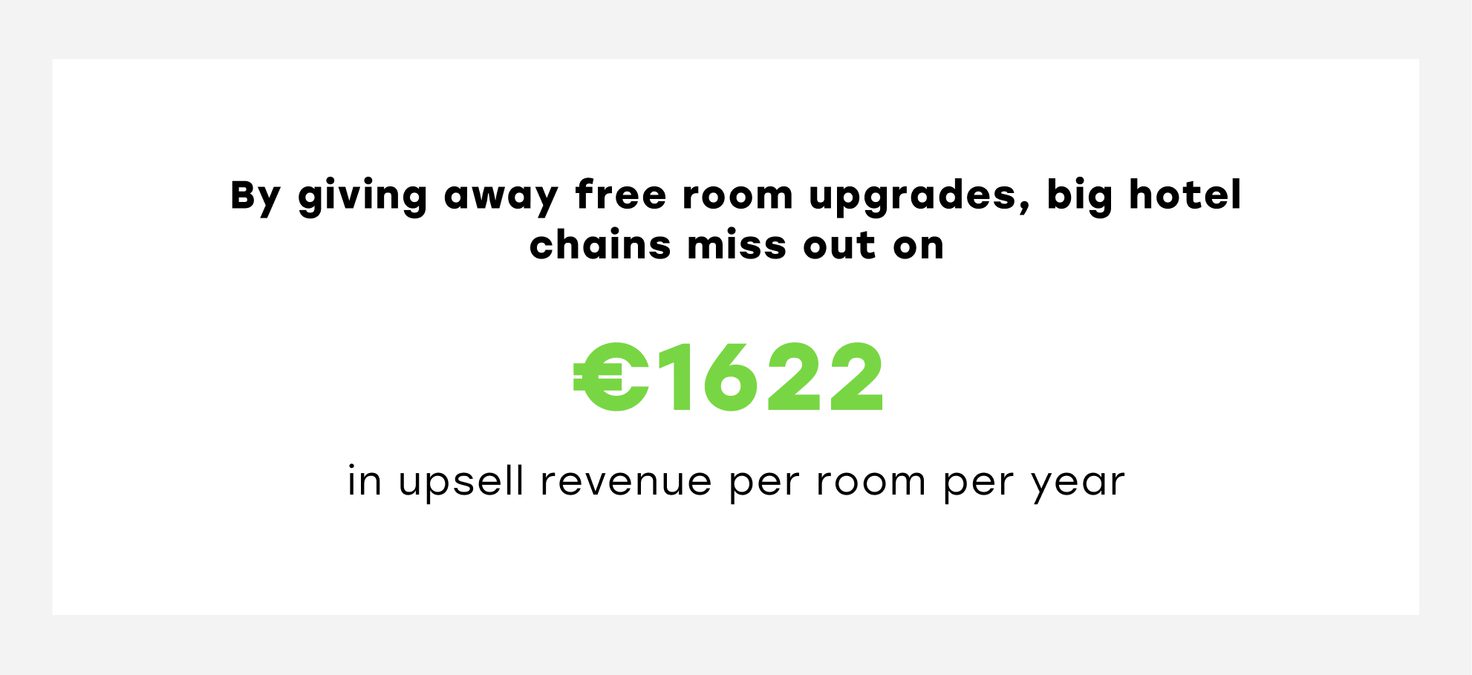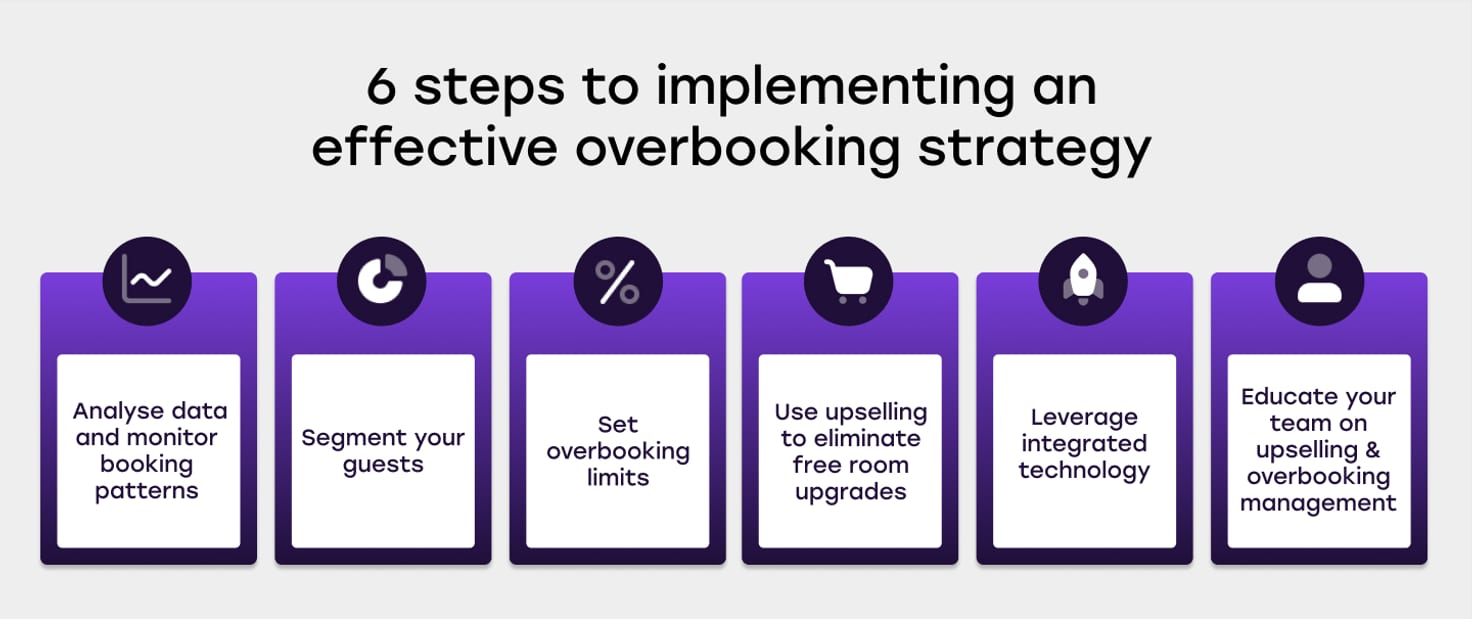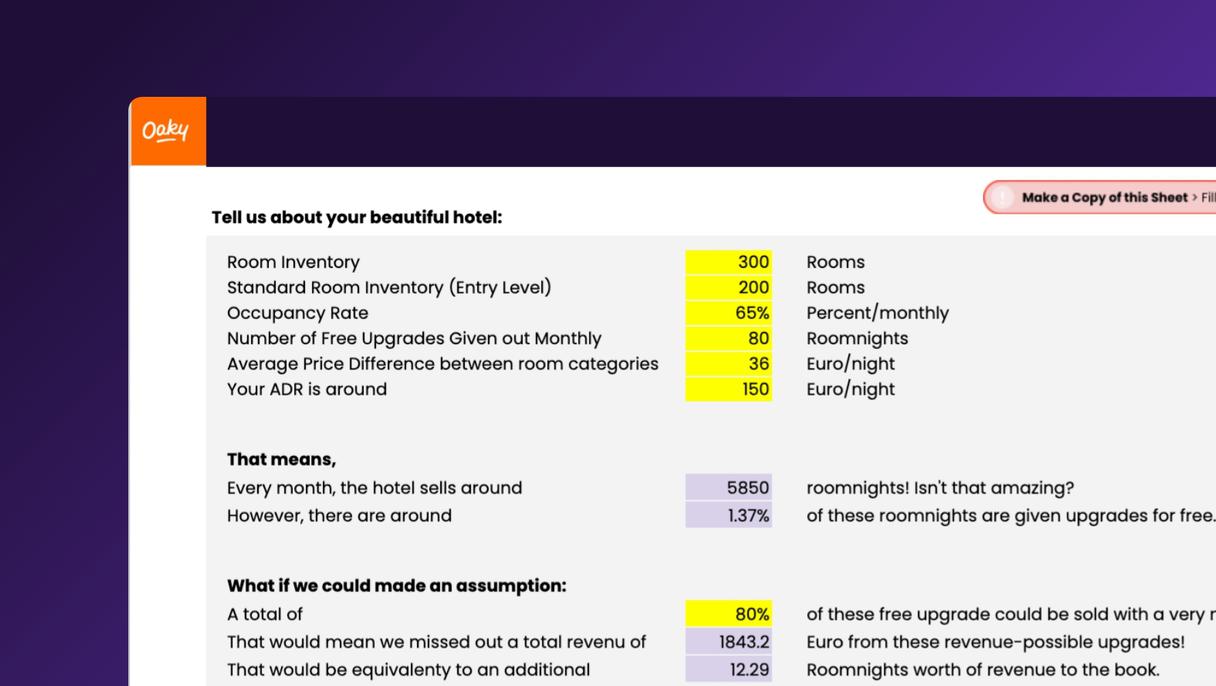Hotel overbooking: The pros, cons and best approaches
Oaky
•

It might sound counterintuitive, but a hotel overbooking strategy can help hotels run efficiently. It’s often used to reach maximum occupancy and generate extra revenue.
That said, it’s risky. As such, it’s essential that a hotel business implements a well-thought-out overbooking strategy. Here’s what you need to know about overbooking practices.
What is the definition of hotel overbooking?
Hotel overbooking refers to accepting more reservations than the available capacity of a hotel and managing it so that it doesn’t negatively impact guest satisfaction or the hotel's reputation. Although overbooking can happen accidentally, many revenue managers use it as a strategy to compensate for potential cancellations and no-shows to prevent revenue losses.

What do hotels do when overbooked
There are various ways in which an overbooked hotel can deal with the situation. In some instances, you have time to act proactively, while in other times it’s about damage control. Check
1. Monitor your occupancy to anticipate overbooking
Keep your overbooking in check by using advanced technology. With the help of a robust property management system (PMS) or a channel manager, you can monitor occupancy levels and track booking patterns to plan wisely for overbookings.
2. Develop standard operating procedures (SOPs) for managing overbooking situations
It’s crucial that hotels have a set of instructions in place for how employees must deal with overbooking. These instructions should be brief, yet comprehensive.
Ensure that your staff know about the procedures that they need to follow when interacting with affected guests. This can include a guest recovery plan outlining the steps employees must take when dealing with frustrated guests.
3. Plan your communication with a guest proactively
If overbooking is anticipated, contact guests as early as possible to inform them about the situation. You can then provide options such as:
Rescheduling the booking
Relocating them to a nearby hotel (and offering free transportation to the different hotel)
Offering them an upgrade to a higher-tier room.
While the latter is the most favourable option for your hotel revenue, ideally you want guests to upgrade their stay to a higher-tier room on their own accord. To do this, hotels worldwide leverage pre-arrival upselling. This way, guests know about the available upgrades in advance, leaving them with plenty of time to switch to a premium hotel room that’s typically harder to get booked.
For example, Hard Rock Hotel and Casino Punta Cana effectively capitalises on guests’ desire to get a better room, yielding an average upsell revenue of as much as $39.42 per room per month.
4. Arrange alternative accommodation and compensation for walked guests
As overbooking strategies are commonly used in the hotel industry, local hotels understand the importance of collaboration. By working together, they can avoid the negative impacts of overbooking and maximise occupancy. It’s best to draw up a contract to structure this collaboration and avoid conflict amongst competitors.
5. Prioritise guests based on loyalty and other factors
A first come, first served approach isn’t recommended for dealing with hotel overbookings. While all guests should receive the same level of care, the reality is that no two guests are the same. It’s best to find a way to honour the bookings of the following types of guests:
Loyalty programme members (especially those with higher status levels e.g. gold or platinum members), frequent guests or repeat guests are more likely to be loyal and have a higher lifetime value.
Direct bookings (guests who booked directly through the hotel booking engine) are often more profitable for the hotel.
Guests with extended stays are more challenging to relocate from a logistical point of view.
VIP guests, corporate clients or guests with special arrangements or contracts with the hotel offer valuable relationships that are crucial for business.
Special occasion guests (e.g. guests who are staying for a wedding, anniversary, or significant event) will find relocating to another hotel to have a greater negative impact on their experience.
Guests with special needs might have specific accessibility requirements or other special needs that might not be easily accommodated at a comparable property.
6. Provide compensation to overbooked guests
If the room availability at the hotel means that guests can still be accommodated there, you can offer a room upgrade. In the event that you can’t offer room upgrades, you can provide compensation in the form of:
Free future stays
Dining vouchers
Loyalty points.
For a displaced guest that needs to be relocated to a nearby hotel, the hotel manager can offer to cover any extra costs that will be incurred like transportation costs to the other hotel and any rate differences.
7. Follow up with your guest
A guest who had to be relocated can cause your hotel some serious reputational damage if they feel the situation wasn’t dealt with correctly. To avoid negative reviews down the line, follow up with relocated guests to ensure they are satisfied with the new arrangements.
It also provides you with an opportunity to gather feedback. You can use this feedback to understand their guest experience and improve future bookings.
What is the overbooking policy in hotels?
The overbooking policy in a hotel outlines the procedures and strategies for managing situations when more reservations have been accepted than available rooms. This policy ensures that the hotel maximises occupancy and revenue while maintaining guest satisfaction. Key elements of a typical overbooking policy might include:
1. Overbooking by a percentage
According to the Journal of Applied Sciences, hotels experience a no-show rate of between 5% and 15% on any given night. To protect against a vacant rooms scenario, a hotel might overbook its rooms by up to 15 percent.
2. Walking policy (Guest relocation)
When overbooking results in more guests arriving than available rooms, the hotel might have to "walk" some guests. This means the hotel can’t honour their confirmed reservation and needs to find them alternative accommodations at another property.
There are two main things to keep in mind when applying this policy. Firstly, you must find and make arrangements with a comparable property. Secondly, you need to develop and adhere to a prioritisation policy. Hotels typically don’t “walk” frequent or loyal guests.
3. Prioritisation policy
A prioritisation policy helps hotels identify the guests that offer the most value. For example, you don’t want to walk your most loyal guests. Use the list discussed above when walking guests to another hotel.
4. Compensation
Overbooking compensation policies at hotels typically vary depending on the specific hotel and its location. Generally, it’s considered good practice for hotels to offer some form of compensation to the "walked" guest.
In addition to finding comparable accommodation, hotels might offer additional incentives like:
A free room upgrade at the new hotel
A free night's stay on a future visit to the original hotel
Vouchers for meals or amenities at the original hotel.
Let the severity of inconvenience and guest loyalty guide you. For example, if the only available accommodation is at a lesser quality hotel or you have no choice but to relocate a loyal guest late at night, you’ll want to increase the compensation.
Is overbooking a good practice for hotels [Pros and cons of hotel overbooking]
As mentioned, there’s risk involved. Ensure that you know beforehand the possible cons involved and weigh them up against the following pros to identify the best course of action.
Pros of hotel overbooking
- Mitigates the risk of last-minute cancellations and no-shows
Cancellations and no-shows are realities in the hospitality industry. They leave hotels with little time to rebook the empty rooms. However, with overbooking, hotels will have guests on “standby” who can fill those rooms that have become available.
- Maximises occupancy
As the impact of last-minute cancellations and no-shows is reduced, hotels boast a better occupancy rate.
- Prevents revenue losses
Revenue is generated via hotel rooms as well as services. Aside from the fact that you’ll lose out on the nightly rate for each night that a hotel room is vacant, it also leaves you with fewer opportunities to upsell ancillary services.
Overbooking also prevents future revenue losses. Each new booking is an opportunity to land a new loyal guest.
- Lets you stay competitive on OTAs
Many hotels overbook their standard room types to attract bookings on online travel agencies (OTAs) since standard room pricing lets them stay more competitive compared to other hotels on OTAs.
Cons of hotel overbooking
- Lost revenue opportunities
By overbooking standard rooms and not upselling your higher-tier rooms, room inventory gets underutilised. Then, whenever overbooking occurs, hotels usually have to give away a free room upgrade or pay compensation to prevent guest dissatisfaction, leading to untapped revenue opportunities.
According to Oaky’s research, big hotel chains miss out on €1622 per room per year. This revenue can be won back by introducing pre-arrival upselling.

- Guest dissatisfaction and hotel reputational damage
Most guests will be happy to be upgraded to a better room for free. However, that’s not always possible.
If a guest gets sent to an alternative hotel, it could lead to disappointment, especially if they already planned certain activities at your hotel. Even if they’re neutral about which hotel they get to stay in, it will probably cause some inconvenience.
- Inefficiencies and disruptions in hotel operations
The process of finding alternative accommodations for "walked" guests can be time-consuming and inconvenient for both the hotel staff and the guests.
How to implement an effective hotel overbooking strategy and optimise your revenue?
The following are crucial steps for creating a robust, overbooking strategy that not only prevents guest dissatisfaction but also empowers hotels to capitalise on their room inventory in the most effective way.

1. Analyse historical data and monitor booking patterns
Each hotel’s booking patterns are unique. What works for one hotel won’t necessarily work for another. Look at your own data like:
Past booking patterns
No-show rates
Cancellations rates
Booking lead times.
By analysing these numbers, you’ll be able to identify trends and an average overbooking rate that you can use as a baseline.
2. Segment guests
Narrow down this data further by looking at the booking behaviour of specific guest segments like business travellers, families, honeymooners, for example. Use this information to determine if there’s a segment that’s more likely to cancel or simply not show up.
3. Set overbooking limits
Combine this historical data that you’ve gathered and analysed to establish maximum overbooking thresholds. Use market conditions like seasonality and local events to adjust these limits dynamically.
4. Implement pre-arrival upselling to eliminate free room upgrades
As mentioned earlier, the introduction of pre-arrival upselling can help hoteliers to make the most out of overbooking. By giving guests the opportunity to upgrade in advance, you can sell out premium rooms more effectively.
This offers two main benefits. It allows you to maximise your profit and frees up standard rooms which can be resold at a competitive price.
5. Use integrated hotel technology to enhance your overbooking management
Hotel upsell software, like Oaky, and a PMS/channel manager can aid hoteliers in improving their overbooking management. To make the most of your hotel tech, double-check that the systems in your stack integrate with one another. For example, if you use a hotel upsell solution, you should consider integrating it into your PMS to streamline the process.
6. Educate your front desk staff on upselling and overbooking handling
Front desk agents aren’t merely there to deal with the occasional double-booking. Data reveals that upselling at the front desk can generate up to nine times more revenue than pre-arrival upselling and can help increase occupancy for higher-tier rooms. With Oaky’s automation capabilities, this process can be smooth and streamlined.
Dealing with an overbooked guest, though, requires training and tact. To prevent guest frustrations and reputational damage to the hotel, you can, for example, offer front desk staff a script like this:
Hotel overbooking script for a front desk agent
Acknowledging the situation:
"Mr/Ms [Guest's Last Name], I sincerely apologise, but it appears we have encountered an unexpected overbooking situation for tonight."
Expressing apology and understanding:
"I understand how inconvenient and frustrating this can be, and I want to assure you that we are committed to making this right for you."
Offering a solution:
"We have arranged for you to stay at [Alternative Hotel Name], which is just [distance/time] away from here. They are expecting your arrival and have prepared a [room type] for you. We will cover the cost of your stay there for tonight, including transportation to and from the hotel."
Additional compensation:
"As a token of our apology, we would like to offer you [additional compensation, such as a complimentary meal, loyalty points, or a discount on a future stay]."
Ensuring smooth transition:
"To make this transition as smooth as possible, we have arranged [transportation details, such as a taxi or shuttle] to take you to [Alternative Hotel Name]. Our team will handle all the details to ensure your check-in process is seamless."
Confirming guest comfort:
"Is there anything specific you need or any special requests we can communicate to [Alternative Hotel Name] to make your stay more comfortable?"
Final apology and follow-up:
"Once again, I apologise for the inconvenience, Mr/Ms [Guest's Last Name]. We deeply value you and hope you will give us another opportunity to serve you better in the future. If you have any questions or need further assistance, please do not hesitate to contact me directly. My name is [Agent's Name], and I'm here to help."
Closing:
"Thank you for your understanding, and please let me know if there is anything else I can do for you. Safe travels to [Alternative Hotel Name]."
Final thoughts
While overbooking your hotel is a wise strategy to alleviate revenue losses from cancellations and no-shows, it works best in combination with pre-arrival upselling. By integrating upselling into your revenue management, you can turn your overbooked standard rooms into lucrative revenue opportunities giving your guests the opportunity to upgrade their experience even before arrival. Discover success stories of hotels effectively implementing upselling to unlock new ancillary revenue streams.


